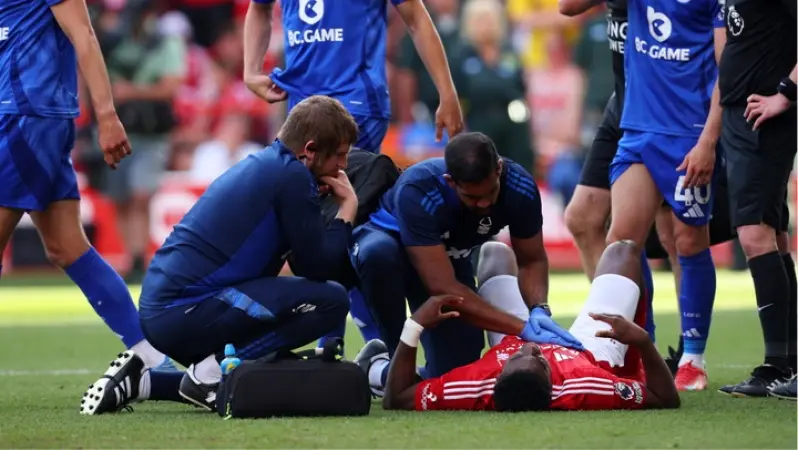THE football world is once again grappling with urgent questions about the offside rule and player safety following the harrowing injury sustained by Nottingham Forest striker Taiwo Awoniyi.
The 27-year-old Nigerian forward was placed in an induced coma after undergoing emergency surgery to treat a ruptured intestine, an injury caused by a collision with the goalpost during Forest’s 2-2 Premier League draw with Leicester City.
Though Awoniyi has since been brought out of the coma and is recovering, the incident has reignited debate over the “delayed flag” offside protocol and whether its continued use is placing players in harm’s way.
Awoniyi’s injury occurred as he sprinted toward the goal to connect with a cross from winger Anthony Elanga. Replays confirmed that Elanga was in an offside position in the build-up. Yet, in keeping with current guidance from the International Football Association Board (IFAB), the assistant referee did not raise the flag, choosing instead to wait until the phase of play had concluded.
This practice, introduced in the 2020/21 season, was designed to protect potential goal-scoring opportunities and ensure VAR has a chance to intervene before a premature offside call. But in this case, no goal was scored, and a player was left with a life-threatening injury in a move that ultimately should have been stopped early.
Former Premier League referee Keith Hackett has been vocal in his criticism of the rule.
“With the introduction of VAR came the process of delaying the flag until the outcome; either a goal or possession of the ball by the defence,” Hackett told BBC Radio 5 Live.
“This is to prevent incorrectly disallowing goals, but unfortunately, it also exposes players to injury.”
Awoniyi’s case is one of the most severe seen to date, but it’s not the first. In March 2021, Wolves goalkeeper Rui Patricio suffered a concussion after a collision with teammate Conor Coady during a play later ruled offside. In December 2023, Manchester City duo John Stones and Ederson were both injured in similar situations.
“There are lots of injuries in this situation. We have to check if it’s the best option to follow the game.”
Former England international Fara Williams echoed those concerns.
“When an offside is clear and obvious, as it was in Elanga’s case, the assistant referee must raise the flag and stop play,” she told BBC Sport. “This has been a time bomb waiting to go off, and sadly, Awoniyi is the one who suffered the consequences.”
According to IFAB’s current laws, assistant referees are instructed to delay raising the flag only when a clear goal-scoring chance is in progress, to allow VAR a chance to make the final call. The rule aims to avoid incorrectly disallowing legitimate goals.
But when no goal results and a player is seriously injured, the value of that delay is called into question. In the aftermath of Awoniyi’s collapse, Forest owner Evangelos Marinakis was seen entering the pitch, visibly angry, not just about the officiating but also about the decision to allow Awoniyi to continue briefly before being withdrawn and rushed to the hospital.
Nottingham Forest have confirmed that Awoniyi underwent a two-stage surgical procedure after being diagnosed with a ruptured intestine. He was placed in an induced coma to aid his recovery and was successfully revived on Wednesday.
The club has launched an internal investigation, not only into the medical team’s in-game handling but also the broader issues surrounding matchday safety protocols and officiating decisions.
The IFAB, which comprises the football associations of England, Scotland, Wales, Northern Ireland, and FIFA, meets twice annually to discuss changes to the Laws of the Game. Emergency meetings can also be convened if a situation demands urgent attention.
With an increasing number of injuries, now punctuated by Awoniyi’s near-tragic experience, the pressure is building for IFAB to reconsider the delayed flag rule.
Amid the intensifying debate, there is a note of relief: Taiwo Awoniyi is showing signs of recovery. After successful surgery and close medical supervision, the Nigerian forward has been brought out of the coma and is now in stable condition.
His recovery will be closely followed, not just by Forest and Nigerian fans, but by a football community that continues to hope for change before another player pays the price.







